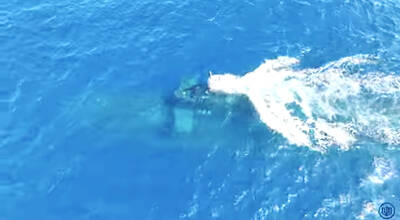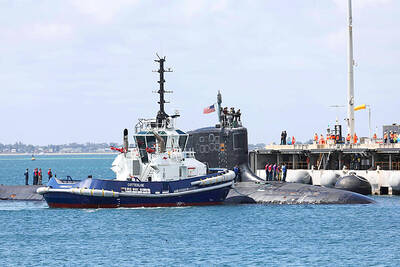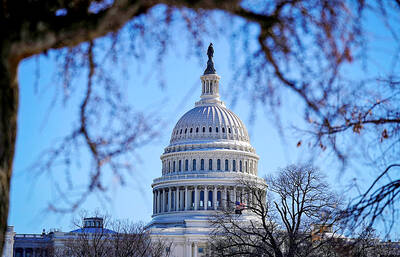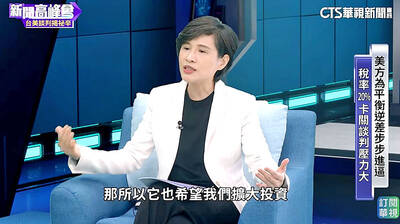The move to recall President Chen Shui-bian (
Severe damage islandwide in the wake of Typhoon Xangsane, the Singapore Airlines crash and protesters demonstrating about the Fourth Nuclear Power Plant, prevented the legislature from addressing the recall, lawmakers said.
In the end, the bills which would need to be passed before the president could be recalled were postponed until next Tuesday.
The two laws scheduled to be reviewed next Tuesday are the Law Governing Legislators' Exercise of Power and amendments to the Presidential and Vice Presidential Election and Recall Law (
As rumors circulated that the postponement represented a display of goodwill to the president on the part of the opposition parties, lawmakers from those opposition parties were united in their effort to scotch any such suggestions, stressing that their determination to recall Chen remained intact.
"Efforts to push for the recall motion [against the president] will be continued," said KMT Legislator Ting Shou-chung (
KMT caucus whip Tseng Yung-chuan (
KMT Legislator Chen Horng-chi (
DPP lawmakers did not take yesterday's change of the legislative agenda as a cause for optimism. But a DPP lawmaker told the Taipei Times that rumors of divided views within the opposition parties were not groundless.
"KMT lawmakers told me that the move would be slowed down in a bid to stabilize the country's political climate. They said it was true that the timing of the announcement [of cessation of construction of the power plant] indeed left plenty of room for discussion, but that that was not solid enough grounds for a president to be recalled," said DPP lawmaker Chen Chi-mai (陳其邁).
"They [KMT legislators] said they did not endorse the recall motion voluntarily .... They were under pressure from the party. They also told me that if the president would exhibit any amity toward opposition parties, they would consider putting the motion aside temporarily," Chen said.
Another primary reason for yesterday's change of agenda, according to Chen, was the KMT authorities' displeasure at seeing the alliance formed between KMT Chairman Lien Chan (

CSBC Corp, Taiwan (台灣國際造船) yesterday released the first video documenting the submerged sea trials of Taiwan’s indigenous defense submarine prototype, the Hai Kun (海鯤), or Narwhal, showing underwater navigation and the launch of countermeasures. The footage shows the vessel’s first dive, steering and control system tests, and the raising and lowering of the periscope and antenna masts. It offered a rare look at the progress in the submarine’s sea acceptance tests. The Hai Kun carried out its first shallow-water diving trial late last month and has since completed four submerged tests, CSBC said. The newly released video compiles images recorded from Jan. 29 to

DETERRENCE EFFORTS: Washington and partners hope demonstrations of force would convince Beijing that military action against Taiwan would carry high costs The US is considering using HMAS Stirling in Western Australia as a forward base to strengthen its naval posture in a potential conflict with China, particularly over Taiwan, the Wall Street Journal reported on Saturday. As part of its Indo-Pacific strategy, Washington plans to deploy up to four nuclear-powered submarines at Stirling starting in 2027, providing a base near potential hot spots such as Taiwan and the South China Sea. The move also aims to enhance military integration with Pacific allies under the Australia-UK-US trilateral security partnership, the report said. Currently, US submarines operate from Guam, but the island could

RESTRAINTS: Should China’s actions pose any threat to Taiwan’s security, economic or social systems, China would be excluded from major financial institutions, the bill says The US House of Representatives on Monday passed the PROTECT Taiwan Act, which states that Washington would exclude China from participating in major global financial organizations if its actions directly threaten Taiwan’s security. The bill, proposed by Republican Representative Frank Lucas, passed with 395 votes in favor and two against. It stipulates that if China’s actions pose any threat to Taiwan’s security, economic or social systems, the US would, “to the maximum extent practicable,” exclude Beijing from international financial institutions, including the G20, the Bank for International Settlements and the Financial Stability Board. The bill makes it clear that China must be prepared

Taiwanese trade negotiators told Washington that Taipei would not relocate 40 percent of its semiconductor production to the US, and that its most advanced technologies would remain in the nation, Vice Premier Cheng Li-chiun (鄭麗君) said on Sunday. “I told the US side very clearly — that’s impossible,” Cheng, who led the negotiation team, said in an interview that aired on Sunday night on Chinese Television System. Cheng was referring to remarks last month by US Secretary of Commerce Howard Lutnick, in which he said his goal was to bring 40 percent of Taiwan’s chip supply chain to the US Taiwan’s almost